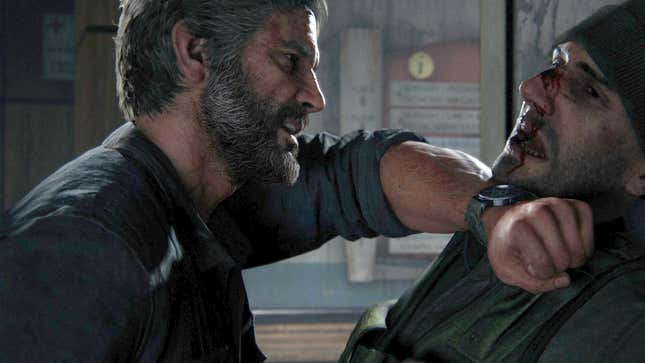
You might not know it based on my scathing recaps of The Last of Us’ second season, but I love this series. I love the moral conundrums it presents, the violent grief it depicts, and the games’ excellent writing that poignantly brings all of those complicated emotions to the surface. What I don’t like is listening to pretty much any of the creative team talk about the series, especially when it comes to weighing in on decade-long discourse around its complex storylines. Even when I agree with series director Neil Druckmann’s interpretation of something, we’d all rather he just let bad readings fester in the corners of the internet than tell us exactly what something means. Nevertheless, he continues to do so in interviews.
In a discussion with the Sacred Symbols podcast (thanks, IGN), Druckmann talked about the end of The Last of Us Part I, which was adapted for television in the HBO show’s first season. In this climactic moment, Joel—a smuggler turned surrogate father to Ellie, the young girl immune to a fungal infection that has leveled the series’ post-apocalyptic world—massacres members of a revolutionary group called the Fireflies who sought to use Ellie’s immunity to create a vaccine. They could potentially have saved millions of lives and helped society rebuild again after decades of ruin. But after months of traveling across the United States to reach the group’s base in Salt Lake City, Joel wasn’t willing to lose Ellie for something as small as the possibility of a world-saving vaccine. After the player fights their way through the facility and escapes with Ellie, Joel lies to her about what happened, and they live happily ever after(?) in Jackson, Wyoming…until the sequel, at least.
It’s a nuanced situation, and ever since The Last of Us launched in 2013, fans have debated the ethics of pretty much every character in this finale. However, one part of the discussion that has persisted is the question of whether or not the Fireflies would have been able to successfully create a cure or vaccine in the first place. This is the post-apocalypse. They’ve got one surgeon here who claims to be able to do the job, and even if they managed to concoct a vaccine, how would they distribute it? All of that is an interesting logistical discussion, but some fans have taken that talking point a step further and tried to claim the potential success of the plan was ever part of Joel’s motivations. It’s very obvious that the man cares about Ellie’s life above all else, and didn’t stop to weigh up the vagueries of vaccine efficacy in a zombie apocalypse I’ve always read these attempts to explain away Joel’s guilt as cope, and the idea that he had a firm confidence that the Fireflies’ attempts would fail as an effort to wash away the reality of Joel’s actions.
Yet now, Druckmann has confirmed that it was always the intention for the group’s medical team to be able to create the cure, essentially nuking that talking point. Am I upset that we can now put this obviously desperate theory to bed? No. Do I wish Druckmann would stop giving definitive answers to a story that has thrived in ambiguity and interpretation? Absolutely.
“Our intent was yes, they could [make a cure],” Druckmann said. “Now, is our science a little shaky that now people are now questioning it? Sure. Our science is a little shaky and people are now questioning it. I can’t say anything. I can say our intent was that they would have made a cure. That makes the most interesting philosophical question for what Joel does.”
Sure, it’s the most interesting interpretation because it actually interrogates everything you know about Joel based on how he presents. Giving him an out is just refusing to engage with the text. Do you want to debate if the Fireflies were equipped to save the world with a vaccine? That’s an entirely separate discussion from Joel’s motivations. But even so, we don’t need every detail spelt out. Maybe it’s because Druckmann is being constantly interviewed about this series after two games, more remasters than I care to count, and two seasons of television, but the more we talk to this dude (and HBO series showrunner Craig Mazin) and ask him to tell us what it all meant, the less interesting the story can be. I don’t want to know if Druckmann thinks Joel was right. I don’t need the author to tell me what I’m supposed to feel. It’s a major reason why the show bothers me so much, because it loves to tell you what lessons you’re supposed to learn, rather than giving you a second to consider what you feel about it.
I wish we lived in a world where The Last of Us’ marketing got to be as bold as the games. Just let it speak for itself.
.